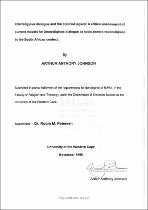| dc.contributor.advisor | Petersen, Robin M. | |
| dc.contributor.author | Johnson, Arthur Anthony | |
| dc.date.accessioned | 2022-06-09T08:27:36Z | |
| dc.date.available | 2022-06-09T08:27:36Z | |
| dc.date.issued | 1998 | |
| dc.identifier.uri | http://hdl.handle.net/11394/9133 | |
| dc.description | Magister Philosophiae - MPhil | en_US |
| dc.description.abstract | This chapter will start the debate by concentrating on the phenomenon or
occurrence of religious pluralism. Thereafter, the reasons for its existence
and its importance in providing a system of coexistence in mutuality will be
examined. The contours of interreligious interaction will be outlined as briefly
as possible, by assessing the processes of interreligious dialogue and the
role this dialogue must play, from a Christian perspective. An attempt will be
made to show how Christianity's view of the other shifted from viewing the
other as posing a threat, to regarding the other as affording an opportunity to
understand personal and individual reality within a context of diversity. A
further attempt is made to show how by mutual effort evil and injustice can be
eradicated through dialogue, within the interreligious context. | en_US |
| dc.language.iso | en | en_US |
| dc.publisher | University of Western Cape | en_US |
| dc.subject | Interreligious dialogue | en_US |
| dc.subject | Colonialism | en_US |
| dc.subject | Reconciliation | en_US |
| dc.subject | Traditions | en_US |
| dc.subject | South Africa | en_US |
| dc.title | lnterreligious dialogue and the colonial legacy: A critical assessment of current models for interreligious dialogue as tools toward reconciliation in the South African context | en_US |
| dc.rights.holder | University of Western Cape | en_US |

